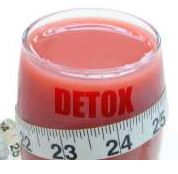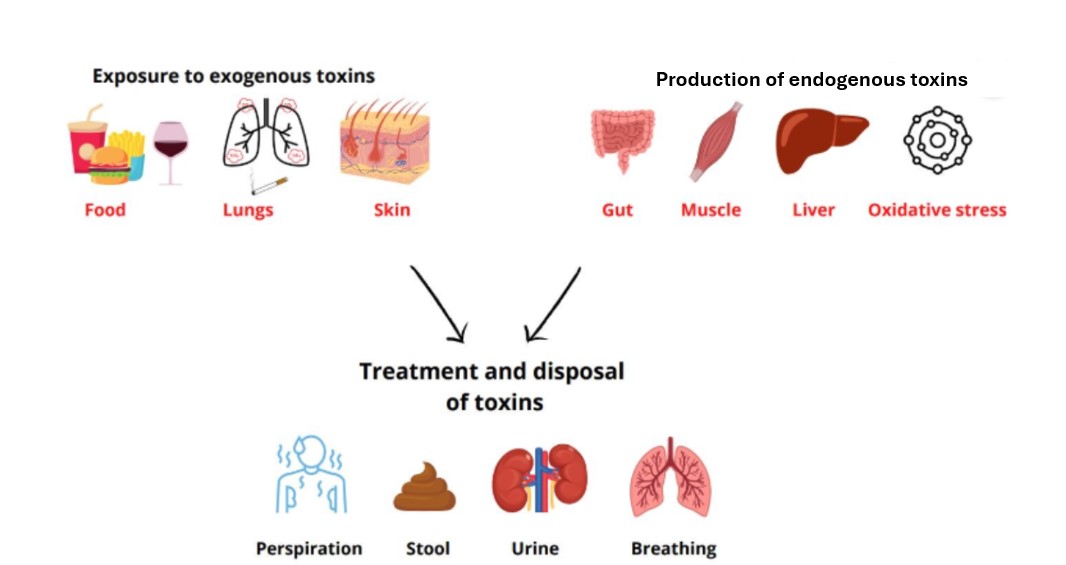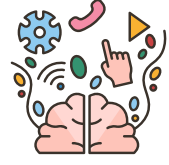Detox diet after the festive period: Info or fake news
Source : Nutriactis/Rouen-Normandie hospital
Summary
- Definition
- Our body: a detox organism
- Effectiveness of detox diets
- Risks of detox diets
- Conclusion
As every year, following the copious meals of the festive period, detox diets make the headlines in many magazines.
The articles generally praise the benefits of these diets, whose objective is to clean the body of toxins and improve elimination after the festive period, which test severely our bodies.

But what are these detox diets? Are they effective? Can they present a health risk?
Definition
Detox diets are becoming increasingly popular around the world, particularly due to the healthy eating trend and its promotion by various web influencers. The main objective of these diets is to eliminate toxins in the body in order to promote weight loss and well-being.
Detox diets are generally recommended for a period of 3 to 21 days and there are different types of detox diets based mainly on :
- Drinking lemon juice
- Drinking only fruit and vegetable juices
- Severe food restriction / Intermittent fasting
- Plants (herbal teas…)

Our body: a detox organism
- During its functioning (metabolism), our body constantly produces waste, also called toxins. These toxins can come from the environment (exogenous toxins) via food (pesticides,alcohol, additives…) or via the skin (cosmetics) but also via the respiratory tract (cleaning products, perfumes…). Waste can also come from our body’s metabolism (breathing, digestion, etc.) and are called endogenous toxins (carbon dioxide).
- Our body has a detoxification system which can daily inactivate and eliminate toxins. The two most important detoxification organs are the liver and the kidneys. Indeed, the liver’s role is to neutralise, transform (thousands of different foreign substances), inactivate and evacuate these substances which can be are harmful to our body. The kidneys filter the blood in order to sort out the toxins and eliminate them in the urine.
The gastrointestinal tract also contributes to the elimination of waste via the stool (excrement), the skin through perspiration and the lungs through breathing.

Effectiveness of detox diets
First of all, it is important to underline that detox diets rarely specify the target organ and the toxin(s) concerned, that is why, as the parameters to be studied are not known, it is very complicated to evaluate their effectiveness.
- A study showed a weight loss and an improvement in some parameters (diabetes, insulin resistance, CRP, etc.) following a detox diet based on lemon juice consumption. However, it is important to specify that the observed effects were identical to those observed following caloric restriction alone (without lemon juice).


- Intermittent fasting, i.e. alternating periods of fasting of varying duration with periods of food intake, can lead to weight loss, but also to an increase in cortisol (stress hormone), which can indicate stress in the body.
- Detox diets are often associated with various metabolic effects, including weight loss. However, these diets are generally associated with caloric restriction which explains most of the weight loss and the main observed metabolic changes. These effects are generally in the short term and stop when the detox diet is stopped.
→ Currently, no rigorous scientific study has established a causal link between detox diets and weight loss or toxins elimination.
Risks of detox diets
The main risks of detox diets is the associated calorie restriction. Indeed, a significant energy restriction can lead to nutritional deficiencies, for example in proteins or vitamins. Furthermore, following a detox diet, weight loss is often observed, but this generally corresponds to a decrease in muscle mass and not in fat mass, which can lead to various physiological consequences, including fatigue; the opposite of the expected effect.
- Moreover, these severe calorie restrictions or intermittent fasting are associated with cognitive restriction (voluntary and controlled reduction of food intake in order to lose weight), which can lead to frustration and anxiety, resulting in a disturbance of mental health and a modification of eating behaviour with a high risk of binge-eating.


- In the short term, the modifications induce by detox diets are reversible when the diet is stopped. However, if the practice persists, these changes can become permanent and greatly increase the risk of eating disorders, obesity, but also orthorexia (obsession with eating healthy food). → Do not hesitate to consult the July Newsletter on dieting.
- → Do not hesitate to consult the article on dieting.
- Some detox diets are also based on the consumption of plant(s). Excessive consumption of plants can have harmful consequences on health. For example, a studie has shown that a high consumption of St. John’s wort can interact with many medical treatments and reduce their effectiveness, including the contraceptive pill; many women on contraceptive pills who drink a large number of St. John’s wort teas have become pregnant.
- In 2012, the European Food Safety Authority examined and rejected the supposed detoxifying properties of around 60 popular foods included in common detox diets, because the claimed effects were unclear and no cause-and-effect relationship could be scientifically established.

It is important to note that some populations are particularly at risk and vulnerable to detox diets, such as children, adolescents, the elderly, people suffering from malnutrition, pregnant or breastfeeding women, or people with diabetes or eating disorders.
Conclusion
No scientific studies on detox diets shows long-term benefits of these diets on weight loss and general well-being. Moreover, the usefulness of these diets remains to be demonstrated, because the body itself has its own detoxification system.

So, if you want to “detoxify” and relieve your body, especially after the festive period, the ideal solution is to limit your exposure to environmental toxins (alcohol, tobacco, ultraprocessed food, high fat diet, etc.). Furthermore, severe calorie reduction or intermittent fasting does not lead to long-term weight loss, but on the contrary leads to an increased risk of deregulation of eating behaviour increasing the risk of eating disorders, obesity and orthorexia.
Thus, believe that a diet with lemon juice or herbal teas could lead to weight loss and cleanse the body is illusory. If you want to maintain your body in good health, the ideal is to have an appropriate diet (containing all food families in adequate quantities) and a balanced lifestyle, including the introduction or perpetuation of physical activity and a regular sleep pattern.

- → Don’t hesitate to consult our article on “Lifestyle and diet”:

-
Download this article in PDF form
pdf – 6 MB